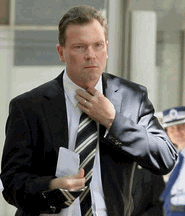|
|
|
|
|
|
|
News & Views item - July 2009 |
![]() NSW Premier To Enlist Vice-Chancellors to Aid Economic Recovery. (July
13, 2009)
NSW Premier To Enlist Vice-Chancellors to Aid Economic Recovery. (July
13, 2009)
 New
South Wales Premier, Nathan Rees, has directed the state's Chief Scientist, Mary
O'Kane, a former vice-chancellor of Adelaide University, to convene a roundtable
in Sydney on July 20. The vice-chancellors of the 11 NSW universities have been
invited and heads of key government departments have been ordered to
attend.
New
South Wales Premier, Nathan Rees, has directed the state's Chief Scientist, Mary
O'Kane, a former vice-chancellor of Adelaide University, to convene a roundtable
in Sydney on July 20. The vice-chancellors of the 11 NSW universities have been
invited and heads of key government departments have been ordered to
attend.
The Premier told The Australian: "[F]ollowing on from the [February] jobs summit, we are bringing people together to focus on the high-skill university research sector. As the economy recovers, we want to rebuild the high skill, research jobs that will ensure a prosperous future for NSW. This is the first time the NSW government has convened such a high-level forum with university vice-chancellors, NSW government agency heads and key industry figures."
In her letter to prospective participants Dr O'Kane wrote in part: "Issues of significant magnitude such as global warming and the economic meltdown call for greater co-operation between the higher education sector and government. The forum is an important step in delivering NSW as the clever, green state," and she told the Australian that a focus of the forum will be the speedier adoption and dissemination of "knowledge created elsewhere".
If useful, can such a forum be anything other than a preliminary to setting up an expert ad hoc group to deliver a critical report recommending the actions required? Otherwise it runs the danger of being seen as another empty governmental gesture. For example when dealing with the economy do you seek the advice of developmental biologist, Princeton University President Shirley Tilghman, or Nobel Laureate, Princeton professor of economics Paul Krugman?
The state's opposition leader, Barry O'Farrell, has a point when he says: "A genuine dialogue with the state's universities to use their skills to help solve NSW's problems should have started a year ago. Coming just months after Labor's so-called jobs summit, this looks like an attempt by Nathan Rees to be seen to be doing something instead of actually getting on with the job of fixing the state's problems."
Perhaps Mr Rees might be prepared to really make use of Dr O'Kane's intelligence, skills and drive to accomplish something far-reaching and worthwhile. If so it may well be a first for any state or federal governmental chief scientist past or present.